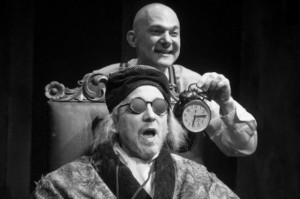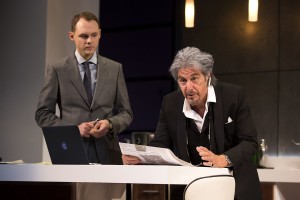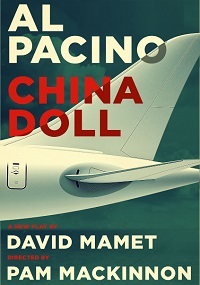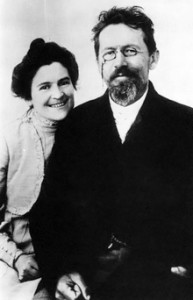David Mamet, WHO is CHINA DOLL?
In the smart new Mamet play, who (or what) does the title refer to? A great question! Unless I’m mistaken, the words “china doll” are not spoken. I took it that the title refers to the girlfriend Francine Pearson. Or, more precisely, Mickey Ross’s perception of her. How Ms. Pearson “appears” in his psyche. How he has fashioned her in his mind.
In the first act of the play, Ross lays it out in simplistic terms. Francine didn’t marry him for looks or for youth. She married him for money. He never factors in that there are subtle factors for which a person might marry. He tells Carson that a beautiful woman will always be able to entertain many offers and she will simply choose the best offer. Ross beholds Francine as a beautiful and brittle object. She is a figurine needing his protection, a valuable chess piece for him to move around his psychic game board.
In Beckett’s important work Endgame, Hamm’s first words are “Me . . . to play.” In CHINA DOLL, Mamet dramatizes the final moves of Mickey Ross, the play’s Machiavellian anti-hero.

Fool (Richard O’Callaghan) and Lear (Tim Pigott Smith in The West Yorkshire Playhouse’s KING LEAR. In CHINA DOLL by David Mamet, Ross is Lear-like for his rage and folly.

Hamm (George Roth) and Clov (Terrence Cranendonk) in Endgame produced by the Cleveland Museum of Art (2011), photo by Peter Jennings. Beckett’s Endgame is the absurdist model for CHINA DOLL by David Mamet

Ross and Carson ( Al Pacino and Christopher Denham) in CHINA DOLL by David Mamet at the Schoenfeld Theater (Photo by Jeremy Daniel)
AKA Ann Black, in this Mamet Play, Chess Piece? Conspirator? Spy?
And because his fiancé doesn’t appear in the play, we are invited to imagine her at the end of a phone call. An Aphrodite of our minds. Even there, her imagined presence offers more than Mickey’s picture. The false name that she uses in the hotel in Toronto, Ann Black, is telling. Miss Pearson is more than she appears.
“Black” may refer to her chess piece color and hint at darkness and subterfuge, a hidden agenda. She doesn’t explain why she used a false name when he asks her. Ross doesn’t press her for an answer even when it becomes clear that his legal problems may have nothing to do with tax evasion.



Recent Comments